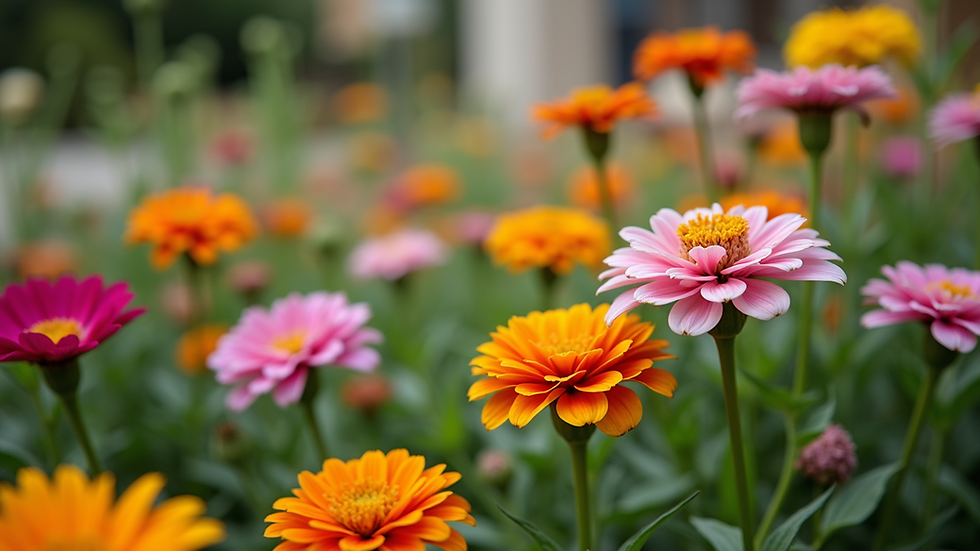How to Attract Pollinators to Your Garden
- VerdeValleyNursery
- Oct 9, 2025
- 4 min read
Creating a vibrant, sustainable garden is a rewarding endeavor, not only for you but also for the entire ecosystem. One critical component of a thriving garden is the presence of pollinators. These fascinating creatures, including bees, butterflies, and hummingbirds, play a vital role in plant reproduction and ultimately in providing fruits, vegetables, and beautiful flowers. At Verde Valley Nursery in Fountain Hills, AZ, we are dedicated to helping local homeowners and gardeners cultivate healthy gardens that attract and support these essential pollinators. In this blog post, we will explore why pollinators matter, identify the best plants for attracting them in Arizona, discuss how to create pollinator-friendly habitats, and highlight sustainable gardening practices.
Why Pollinators Matter
Pollinators are crucial for the health of ecosystems and agriculture. According to the United States Department of Agriculture, about one-third of the food we consume relies on pollination from bees, butterflies, birds, and other creatures. They help in the fertilization of plants by transferring pollen from one flower to another, facilitating the growth of fruits, seeds, and nuts. Without pollinators, many of our favorite foods would become scarce or disappear altogether.
Pollination also supports biodiversity by enabling various plant species to thrive. A garden filled with diverse plants attracts a range of pollinators, which fosters a balanced ecosystem. Moreover, the presence of pollinators in your garden indicates a healthy environment, which in turn supports a variety of wildlife, including birds and beneficial insects.

Best Plants for Pollinators in Arizona
When choosing plants for your garden, it’s essential to select varieties that are not only attractive to pollinators but also well-suited to Arizona's climate. Here are some excellent options:
Desert Marigold (Baileya multiradiata): Bright yellow flowers bloom for much of the year, attracting bees and butterflies. They thrive in full sun and are drought-tolerant, making them perfect for Arizona gardens.
Salvia (Salvia spp.): With various species that offer vibrant blue, purple, and red flowers, Salvia is a favorite for hummingbirds. Plant a few varieties to keep the blooms coming throughout the growing season.
Penstemon (Penstemon spp.): This is another excellent choice for attracting bees and hummingbirds. Penstemons come in various colors and are well-adapted to dry conditions.
Lantana (Lantana camara): Known for its bright clusters of flowers, Lantana is a magnet for butterflies. It’s also drought-resistant and thrives in poor soils.
Zinnias (Zinnia spp.): These vibrant annuals are easy to grow and bloom all summer long, attracting butterflies in droves. They also come in various colors and sizes, providing versatility in your garden.
Additional Recommendations
When selecting plants, prioritize native species. Native plants are better adapted to local conditions and require less water and care. Additionally, they support local pollinator species that have evolved alongside them for generations.

Creating Pollinator-Friendly Habitats
In addition to planting the right flowers, creating a welcoming environment for pollinators is essential. Consider these strategies:
Diverse Planting: Incorporate a variety of plants that bloom at different times throughout the year. This ensures that pollinators have food sources from early spring to late fall.
Provide Shelter: Pollinators need safe spaces for nesting and resting. Leaving areas of bare ground or creating small brush piles can provide shelter for ground-nesting bees and other insects.
Avoid Pesticides: Chemicals can harm pollinators; instead, use organic pest control methods. Planting certain flowers, like marigolds or nasturtiums, can help deter pests naturally.
Create Water Sources: Pollinators need water, too. Consider adding a shallow birdbath or a small pond to your garden. You can even place stones in water to allow insects a place to land and drink.
Incorporate Vertical Elements: Structures like trellises and fences can help attract climbing plants, providing additional layers of food and shelter for pollinators.
Sustainable Gardening Practices
At Verde Valley Nursery, we advocate for gardening practices that promote sustainability. Implementing eco-friendly approaches can make your garden more hospitable to pollinators:
Composting: Composting reduces waste and enriches soil, improving plant health and the garden's overall ecosystem.
Using Native Soils: Utilize local soil to strengthen the resilience of your plants. This promotes a balanced habitat and reduces the need for chemical fertilizers.
Mulching: Organic mulch can help in maintaining soil moisture, reducing weeds, and providing habitat for beneficial insects.
Rotate Crops: If you're growing fruits and vegetables, rotating your crops helps avoid pests and diseases, creating a healthier garden.
Educate Yourself: Stay informed about the best practices for gardening and caring for pollinators. Attending workshops or reading literature available at Verde Valley Nursery can be immensely helpful.

The Impact of Your Garden on Local Ecosystems
By creating a pollinator-friendly garden, you are making a significant contribution to the local ecosystem. Each flower you plant can directly help sustain the population of local bees, butterflies, and hummingbirds.
Your efforts extend beyond your own garden - pollinators thrive in interconnected landscapes. When more homeowners prioritize pollinator-friendly gardens, we can improve biodiversity, contribute to healthier food systems, and support a variety of wildlife in our region.
At Verde Valley Nursery, we provide the tools, plants, and resources necessary for you to cultivate a sustainable and vibrant garden. We believe that every garden has the potential to be a sanctuary for pollinators. By following these practical tips, you can play an active role in supporting these essential creatures within your own backyard.
The creation of a pollinator-friendly garden is an investment in both your own enjoyment and in the sustainability of your local environment. Let’s work together to make Fountain Hills a more vibrant and ecologically friendly place!



Comments